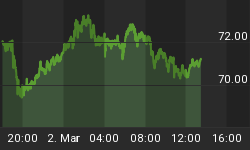Ah, August.
The dog days of summer are here, signaled by the declining probability that anyone you call today will actually be in the office and not on vacation. Markets are thin, and excitable; today, they were excited by more good bank earnings (driven, as most of the good earnings have been, by declining reserves and charges).
The ISM was a little stronger-than-expected, at 55.5 compared with estimates of 54.0. While that wasn't a complete surprise, since the Chicago PM report had been strong on Friday, a second dose of the same good news has lately been sufficient to keep the market elevated. The S&P skyrocketed a healthy 2.2% on this thin gruel of good news.
And yet, stocks remain below the highs of the June bounce. The VIX, while at the bottom of the recent range, is still somewhat elevated at 22.0, and the 10-year yield is still below 3%. It isn't like the bond bulls are being carried out. At this point, it is still hard to tell whether the bond bulls or the stock bulls will be the suckers.
It may be the bond bulls (or, perhaps, both!). As oil topped $80 today, a story in the Wall Street Journal Online carried the title "Big Investors Fear Deflation."
"Deflation isn't just a topic of intellectual curiosity, it's happening," says Mr. Gross, who runs the $239 billion mutual fund Pimco Total Return Fund, citing an annualized 0.1% decline over the past two years in the U.S. consumer-price index. "It's an uncertain world that's tipping toward deflation."
As Bill Gross surely knows, this is baloney. While the headline CPI has declined over the past two years, that is entirely because oil dropped more than 50% over that period. Core inflation has risen at 1.3% per annum over the last two, and as I have pointed out many times - and as Bill Gross certainly knows - core inflation is only that low because the housing bubble is unwinding.
I am not usually comfortable with being on the opposite side of Grantham, and being on the side of the argument opposed to Grantham and Gross and Tepper and Fournier ought to make me worry. But in this case, they're wrong. Hopefully, I will get some credit if I turn out to be right. Or maybe one of those guys will hire me as a consultant.
Their mistake is the usual mistake. They focus on the growth of the economy relative to its potential and the fact that European nations (soon to be followed by our own) are implementing relative "austerity measures" that will provide a negative stimulus. According to standard economic theory, this keeps unemployment above the NAIRU (Non-Accelerating-Inflation Rate of Unemployment), which implies an ever-decelerating inflation rate. With inflation already low, this implies deflation is basically unavoidable since getting Unemployment below NAIRU, with governments contracting, will not happen in the short-run.
Now, a funny thing about NAIRU is that no one can tell you what its level is. Because, you see, it seems to move around. A lot. To figure out where NAIRU is, you need to figure out when inflation is accelerating, and then look at what the unemployment rate is when it goes from accelerating to decelerating and vice-versa (well, a sophisticated version of that, involving regressions and other tools of the trade). So, if inflation suddenly starts going up now, it will imply that NAIRU may be as high as 9.5%-10.0%.
We are in a very exciting period for the economic science, because we're probably going to be conducting a key test of the efficacy of monetary versus fiscal policy. I believe that with governments shrinking - not because the politicians want it, but because they perceive that the voters and the markets want it - monetary authorities will add additional extraordinary stimulus, and we will have inflation.
Usually, fiscal and monetary policies coincide. When recession looms, the Fed cuts rates and government deficits swell, either of which (depending on the theory you're looking at) may cause growth to increase and inflation to rise. As a result, we ordinarily have a hard time being sure about what actually caused the recession to end or prices to rise. We are about to travel an interesting path, where the arrows of policy are pointing in opposite directions. If I am right about that (the Fed might decide not to add liquidity like I expect, or the Congress might break the piggy bank again, but I think the test will happen), then if inflation goes up we will have a very strong result for the monetarists, and if it declines then we will have a very strong result for the Keynesians.
Divining the winner won't be quite that easy, of course, because the United States is not a closed system and other governments' fiscal stimulus and other monetary authorities' stimulus matters to us somewhat. But I am hopeful that we can have a clear winner.
That being said, we have had such tests before: in the 1980s and 1990s, lower unemployment and declining money growth produced...lower inflation. In the 1970s, higher unemployment and accelerating money growth produced...higher inflation. In Zimbabwe, high unemployment and extremely rapid money growth has produced...hyperinflation. In Japan, low unemployment and slow money growth (combined with declining money velocity) has produced...marginal deflation. So far the record looks pretty clear, with the monetarists winning every major tilt, but every additional point helps.
So I am going to stand with history and against Gross, Grantham, Fournier, Tepper, and plenty of others. As Frederick Douglass once said: "One man with God is a majority." I don't know where the Almighty stands on this one, though. It is probably best for all of us if He isn't an economist at all.
















